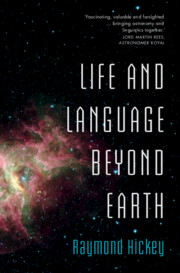Book contents
- Life and Language Beyond Earth
- Reviews
- Life and Language Beyond Earth
- Copyright page
- Contents
- Tables and Figures
- Preface
- How to Use This Book
- Part I Introduction
- Part II The Universe We Live In
- 4 Trying to Grasp Size
- 5 Star Formation and Planets
- 6 The Likelihood of Life
- 7 Possible Conditions on an Exoplanet
- 8 How and Where to Look for Exolife
- 9 The Limits of Exploration
- 10 Assessing Probabilities
- Part III Our Story on Earth
- Part IV The Runaway Brain
- Part V Language, Our Greatest Gift
- Part VI Life and Language, Here and Beyond
- Book part
- Glossary
- Timelines
- Figure credits
- References
- Bibliography
- Index
5 - Star Formation and Planets
from Part II - The Universe We Live In
Published online by Cambridge University Press: 16 September 2023
- Life and Language Beyond Earth
- Reviews
- Life and Language Beyond Earth
- Copyright page
- Contents
- Tables and Figures
- Preface
- How to Use This Book
- Part I Introduction
- Part II The Universe We Live In
- 4 Trying to Grasp Size
- 5 Star Formation and Planets
- 6 The Likelihood of Life
- 7 Possible Conditions on an Exoplanet
- 8 How and Where to Look for Exolife
- 9 The Limits of Exploration
- 10 Assessing Probabilities
- Part III Our Story on Earth
- Part IV The Runaway Brain
- Part V Language, Our Greatest Gift
- Part VI Life and Language, Here and Beyond
- Book part
- Glossary
- Timelines
- Figure credits
- References
- Bibliography
- Index
Summary
Stars form when vast clouds of gas and dust begin to swirl and collapse with a concentration of matter at the centre. Around the newly born star a proto-planetary disk rotates, out of which planets can later evolve by clumps arising and accumulating ever greater amounts of material. The smaller planets which arise tend to be largely composed of rock, like the first four in our Solar System, whereas the larger ones tend to be gas or ice giants, like the outer four in our system.
- Type
- Chapter
- Information
- Life and Language Beyond Earth , pp. 58 - 68Publisher: Cambridge University PressPrint publication year: 2023

